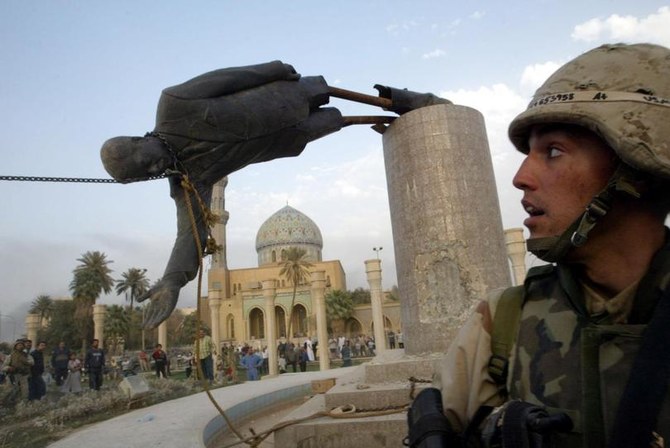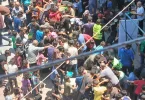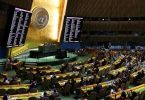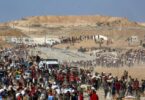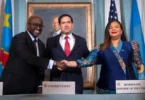Sir John Jenkins
Mesopotamia has always been a place where imperial fantasies go to die — and are just as perpetually reborn. As it happens, this year is not only the 20th anniversary of the US-led invasion of Iraq, on Sunday to be exact. It is also the 2,354th anniversary of the defeat of the Achaemenids by Alexander the Great at the Battle of Gaugamela; the 2,076th anniversary of the defeat and death of the Roman Triumvir Marcus Licinius Crassus at the hands of the Parthians at the Battle of Carrhae; the 1,660th anniversary of the defeat and death outside Samarra of the Roman Emperor Julian at the hands of the Sassanians; the 879th anniversary of the collapse of the Crusader state of Edessa at the hands of Nuruddin Al-Zengi; and the 106th anniversary of the capture of Baghdad from the Ottomans by Gen. Stanley Maude, on March 11 to be exact.
Over the past month or so, there has been a deluge of commentary on the aftermath of 2003. I have read most of them. And I have now just finished reading perhaps the most startling of them all — an article in The Interpreter by Paul Bremer, the head of the Coalition Provisional Authority, appointed by President George W. Bush in 2003, entitled, “What Went Right in Iraq.” It is a list of what Bremer believes to have been his and the CPA’s great achievements. It is only a pity, I suppose, that we lack similar reflections from Darius, Crassus, Julian, Count Joscelin or Enver Pasha.
I am not going to relitigate the actions of the CPA, such as the way in which the Iraqi armed forces and police were disbanded, the de-Baathification decree and its implementation, the efforts to establish advanced financial and other institutions, the drafting of a constitution so full of holes you could drive a coach and horses through it, the hasty recruiting of thousands of Americans and others — with only the haziest notion of where and what Iraq was — to staff the CPA, and the basic policy confusion in Washington and London about what could realistically be accomplished with the tools to hand.
I was not there then; I was in Jerusalem instead, dealing with an entirely different set of challenges. And in any case, the ground has been thoroughly covered by the reporting of the Congressional Budget Office and Research Service, the Departments of State and Defense in the US, the Chilcot Report in the UK (the terms of reference for which I helped draw up and to whose deliberations I contributed), and a vast library of detailed and sometimes excellent books written by journalists, academics and other observers.
My direct involvement with Iraq dates from 2007, when I became director for the Middle East and North Africa in the Foreign Office in London, through my time as ambassador in Baghdad, to 2011. Four years. But there has not been a moment since 2011 when I have not reflected on the lessons we should have learned.
The fundamental problem with Bremer’s claims is not that they are untrue. It is that they are irrelevant to what has happened to Iraq since 2003. And they ignore history. Saddam Hussein was a savage dictator, with a brutal and grotesquely entitled family, who relied on kinship, tribal and minority religious groups for support in the face of widespread fear. There were reasons why he launched an attack on Ayatollah Khomeini’s Iran in 1980. But he and his generals badly mismanaged the war. And his invasion of Kuwait in August 1990 — designed to compensate for imagined Iraqi financial losses — was another spectacular misjudgment.
The international community compounded that misjudgment after his defeat both by allowing his army to take its revenge on the Shiites of the south and — for a time — on the Kurds of the north, but also by failing to agree through the UN how to manage Saddam’s inevitable and foolish defiance. That led to one of the longest and most damaging sanctions regimes of modern times, the impoverishment of large slices of Iraqi society and the corruption and criminalization of Iraq’s economy — and indeed parts of the UN. Saddam could have avoided all of this simply by complying with the terms of successive UN Security Council resolutions. He refused to do so, just as he refused to admit that he had no weapons of mass destruction in the run-up to 2003.
This was folly. But it was also folly to believe that an Iraqi social fabric that had been ripped apart by Saddam and by sanctions could simply be stitched back together again by military force, provincial reconstruction teams — often with little local knowledge — and the edicts of imperial proconsuls. On May 1, 2003, President Bush famously declared “Mission Accomplished.” That was folly too. What followed was a vicious civil war, as a result of which Iran, which had originally been intimidated by the US show of force, emerged as the ultimate victor.
The irony is that a plurality of Iraqis in early 2003 had, in varying degrees, welcomed the US-led military intervention. They wanted something better — and they certainly wanted an end to the socially destructive isolation in which they had lived for more than a decade. Even in 2010, the year that Nouri Al-Maliki stole the elections from Ayad Allawi, with US acquiescence, there was still a chance to salvage something from the wreckage. But having arrived in Iraq proclaiming the virtues of democracy, when Iraqis actually voted for change, the US decided that change was too risky. So much for liberal pieties.
This has, of course, had a damaging impact on the region. Whatever the virtues of successive Iraqi prime ministers (and virtue is often lacking), they do not govern the country. Hidden half out of sight, Iran and its ideological allies do. The corruption of sanctions has been replaced by the exploitative and extractive corruption of its neighbors, Iran and Syria. And the new Iraqi elites — often strangers to their own country in 2003 — control the only instruments that matter: the bureaucracy and the army. If a new conflict with Iran happens, they will drag Iraq, like Lebanon, into it.
It has also had a massively damaging impact on Western politics. The cumulative loss of confidence in the inevitability of progression has caused a dramatic loss of faith in governments everywhere, notably in the US and the UK, but in practice more widely. Iraq was not the only cause: the financial crisis of 2007/8, the rise of China, the consequences of unchecked migration and the explosion of social media have all contributed. But the high hopes of the millennium, with the end of the Balkan Wars and the apparently inexorable global diffusion of social liberalism, have given way to a much darker mood. The catastrophe of Iraq is exhibit No. 1 for those who claim that governments should never be trusted.
Perhaps in the long run we shall see this simply as a welcome return to realism and a salutary humility about the possibility of shaping the world in our own image.
Recent developments in the Gulf show that regional governments are beginning to make their own arrangements for security in the face of Western uncertainty.
If we hold our nerve, there is still much that we can do together. For Iraq is not yet so far gone that it cannot recover. There is deep resentment among many Iraqis about the way in which Iran has instrumentalized their weakness. And Iraqis also know that their country, whatever its origins, remains central to the region as a whole. Mesopotamia is where the Arab, Persian and Turkish worlds meet. It is a gateway to the Indian Ocean and to Transcaucasia. All the great Abrahamic faiths belong there. It is the desert and the sown, the shrine cities of the south and the mountains of the north, all watered by the great river systems of the Tigris and the Euphrates.
The distinguished Iraqi social scientist Ali Al-Wardi wrote of the duality of Iraqi identity. It is now more like a plurality. And that makes Iraq special. But it needs support. Reintegrating Iraq into the wider Arab world, where it belongs, needs to take account of — and celebrate — that plurality. And it will take time and patience.
If others wish to loot Iraq and supply weapons to their proxies, those with Iraq’s best interests at heart should instead build schools, hospitals, clinics, power plants and businesses. Make people’s lives better, not worse. It will take decades. But it will be worth it. And that is the only way to give Iraq back its independence and its position as the keystone of regional security.
After all, there has always been a reason that empires fought over Mesopotamia. It matters.

